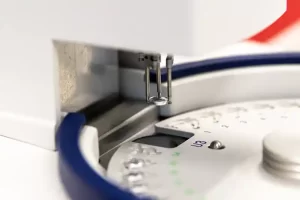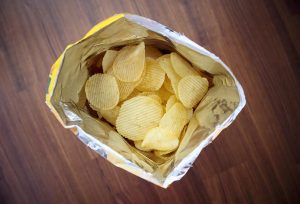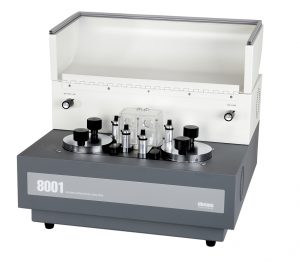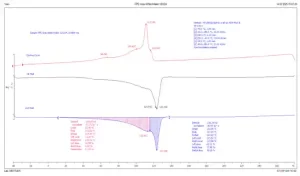Antiblock Additives in Flexible Packaging
At Flex-Pack Engineering we have many years of experience in developing antiblock solutions for our customers. But what is “blocking”?
Blocking is when your packaging or film sticks to itself. This happens due to a glass plate effect where all of the air between the layers of packaging has been removed or squeezed out, usually due to the polymer being extruded very smoothly and then wound tightly on to a roll. To avoid this sticking, you can put antiblock additives into the plastic which are usually inorganic minerals such as talc, synthetic silicas, or polymeric materials that are added into the polymer that create a rough surface on a micro layer. This rough surface on the polymer allows the two packaging layers to come into contact with each other and not stick or cling to one another. This is very desirable for the end-use consumer as it helps in the opening of flexible packaging products.
Finding Antiblock Solutions for Flexible Packaging
At Flex-Pack Engineering we have a great deal of experience in antiblock additive design and a robust network of trusted mineral suppliers and polymer additive vendors. When working with antiblock additives there are many factors to consider such as mineral selection, particle size, particle size distribution, top cut, and color. It is critical to design and choose minerals for antiblock additives that will not alter the color or clarity of the final flexible packaging product. We understand minerals, mineralogy, optimum particle size and particle size distributions to create the best antiblock additive effectiveness to be able to optimize your antiblock performance in end-use applications. We do this by selecting a number of mineral types and go through a compounding step to create very well disbursed masterbatches that will then be tested for their dispersion, to ensure their dispersion is pristine.
The second step is to take those masterbatches and use a second compounding step where we let those masterbatches down into a final resin that doesn’t contain any other antiblock additives. Our goal is to fully evaluate through the experiment the mineral or polymer additive loading level to be able to determine the optimum loading level for the best antiblock performance without impacting clarity, gloss, coefficient of friction, yellowness index or any other color performance criteria.
After these first two compounding steps are completed, we will do a third processing step which is making film. We’ll make a thin film usually on a blown film line because that process is most common and the particles are free to move within the polymer matrix so that they get to the surface, and you are not hindering the particles with anything but air, so they create a nice, rough surface to keep the subsequent layers from sticking together.
Once we make the film, we take it into the laboratory and perform tests to evaluate the performance of the antiblock additive. We look at blocking force, coefficient of friction, haze transmission and clarity, color change or effect, and also any gloss changes. We want the film to stay as glossy as possible yet still be somewhat rough so we can trap air between the layers so that the film will open up easily.
In the flexible packaging industry, the idea of using antiblock additives in films is well known but not usually studied under controlled conditions. As mineral companies find different minerals to be used as an antiblock additive, or they look at different blends of antiblock additives, they can improve the performance, especially around clarity and color. At Flex-Pack Engineering, we can bring our knowledge of the latest trends in antiblock mineral additives to optimize a high-performance solution for your situation.
Oftentimes in the production process if films are blocking, (sticking together), personnel don’t always take into consideration if they can use a better antiblock additive in the film formula. We have seen production problems related to sticking dealt with by turning up the feeder or using more antiblock additive than is really necessary. While these actions may reduce blocking, the other factors such as clarity, color, and gloss can be hindered because there is too much mineral in the process. It’s important to know and consider for each antiblock additive that you use what is the optimal loading level to give you the best performance so you can save money and produce a good and consistent product. This is where Flex-Pack Engineering can really help optimize your antiblock additive strategy.
Choose Flex-Pack Engineering for the Best Antiblock Solutions
While the concept of antiblock additives seems simple – you roughen the film surface to mitigate the film sticking together – if you really want to optimize for best performance, efficiency and cost, you really have to understand the type of antiblock additive you are working with, and what the limitations are so that you don’t use too little or too much antiblock in your process. If your customers can’t open their bags due to poor performing antiblock, ultimately they will stop buying from you.
It’s really important to understand how to best optimize antiblock additives to ensure high performance. And this also goes for all the additives you are using in your production process such as antistatic, slips, UV absorbers and hinderers, antifogs, and everything else. As the film manufacturer you really have to understand what it is you are buying from your masterbatch suppliers and how to best use them. The companies that do invest the time and resources to understand how to use additives are the world-class film producers.
At Flex-Pack Engineering we will bring our over 30 years of experience to guide the mineral suppliers, polymer additive suppliers, the compounders who are making the masterbatches, and ultimately the film manufacturers in terms of understanding their additives and impacts of those additives. We have been working with anti-block additives for a very long time. We are very technically and detail oriented. We have the knowledge and expertise to provide optimal antiblock additive solutions for the best performance.
Ready to have a conversation? Give us a call at 330-704-9436 or fill out the request form on this page.






